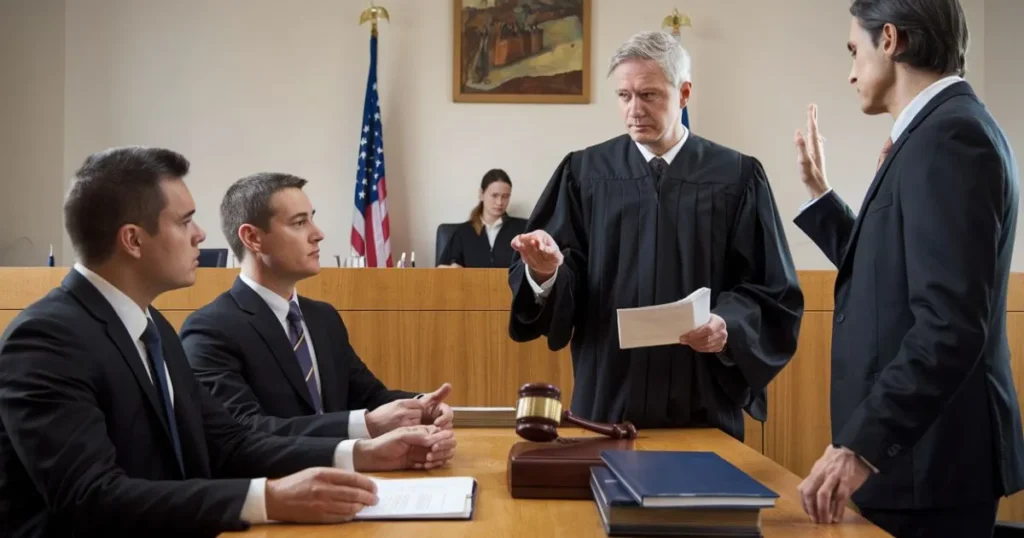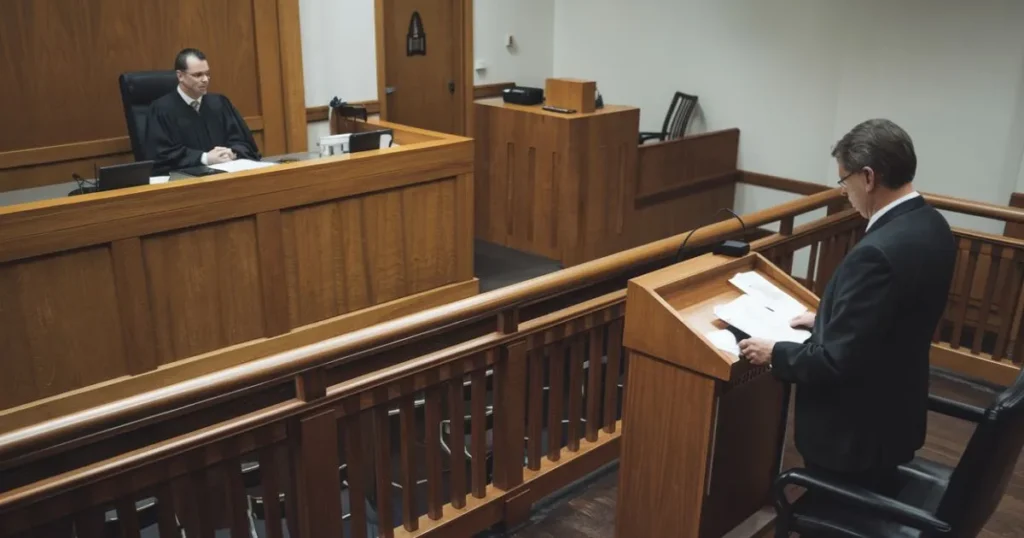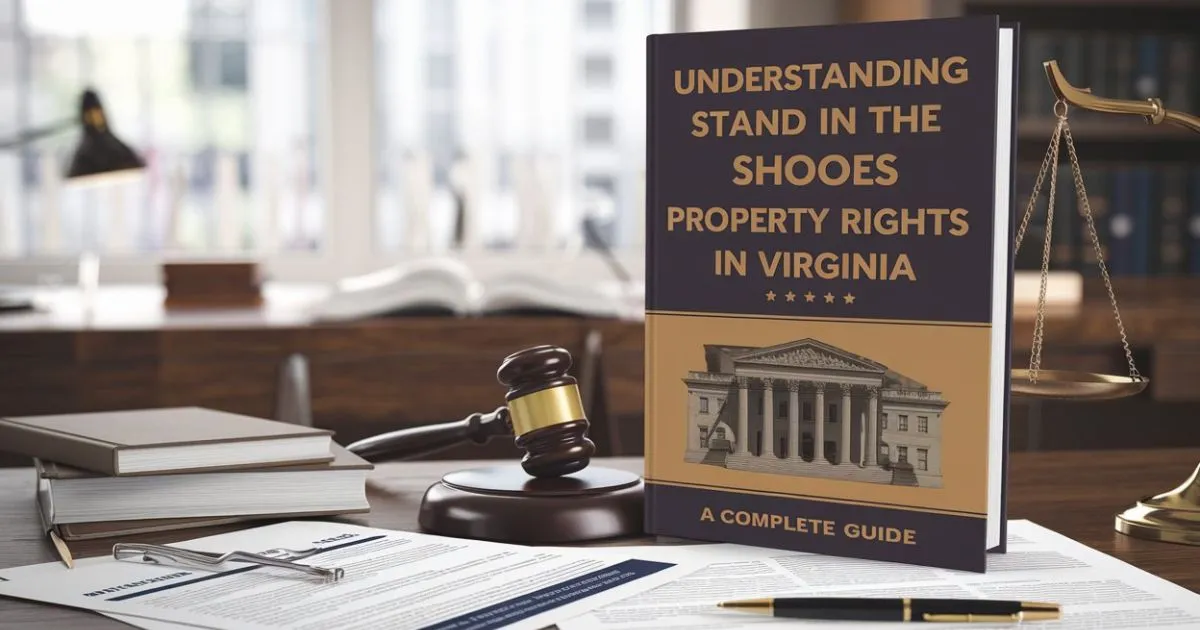The Stand in the Shoes Doctrine is a legal principle in property law. It affects how property rights are transferred. This doctrine says new owners get the same rights as previous owners according to property rights in Virginia.
Virginia has a long history of property rights. The state’s laws about property go back to colonial times. These laws have changed over the years to fit modern needs.
Understanding property rights is crucial for Virginians. It helps them protect their assets. It also helps them know their responsibilities as property owners. This knowledge can prevent legal issues in the future in property rights of Virginia.
How the Stand in the Shoes Doctrine Works in Virginia
The Stand in the Shoes Doctrine is a legal concept in Virginia property law. It means new property owners inherit the rights of previous owners. This applies to both benefits and obligations tied to the property. The doctrine ensures fairness in property transactions.
Compared to other doctrines, Stand in the Shoes is unique. It differs from the doctrine of first possession. It also contrasts with adverse possession laws. The Stand in the Shoes Doctrine focuses on maintaining existing property rights.
Impact of Stand in the Shoes Doctrine on Property Inheritance
The Stand in the Shoes Doctrine in Virginia directly affects how property is inherited. It allows heirs or beneficiaries to “stand in the shoes” of the unique owner, inheriting their rights and duties. This can simplify the transfer of property but also pass on existing debts or disputes.
How the Doctrine Affects Heirs and Beneficiaries
The Stand in the Shoes Doctrine affects heirs and beneficiaries in Virginia. It determines how they receive property rights in Virginia from deceased owners.
Heirs inherit the same property rights as the original owner. This includes both benefits and restrictions. Beneficiaries of wills or trusts also receive these rights. The doctrine ensures a smooth transfer of property rights in Virginia across generations.
Case Examples: Inheritance Scenarios Under the Doctrine
In one case, a man inherited a house with a shared driveway. The previous owner had an agreement with the neighbour about driveway use. Under the Stand in the Shoes Doctrine, the new owner kept this agreement. He didn’t need to make a new one.
Another example involved farmland with water rights. A woman bought this land from a family. The family had permission to use a nearby stream for irrigation. The new owner could still use this water right. The doctrine ensured she “stood in the shoes” of the previous owners.
Legal Challenges in Applying the Doctrine

Applying the Stand in the Shoes Doctrine can be tricky. Sometimes, old agreements are unclear. This can lead to disputes between new owners and neighbors. Courts must then interpret these agreements carefully.
Another challenge is when property changes hands multiple times. Each transfer can complicate the rights and duties. It can be hard to trace the original agreements. This makes it difficult for courts to decide what rights transfer.
Related Blogs: How Much Landlord Insurance Do I Need? A Comprehensive Guide
Implications for Property Owners and Tenants
Rights and Responsibilities of Property Owners
Property owners inherit the rights and duties of the previous owner. They must control the assets, hold it, and comply with present hire agreements. Owners need to respect tenant rights, like giving proper notice for any changes.
They are also responsible for resolving disputes and debts linked to the property. Owners cannot change lease terms without tenant consent. They must comply with Virginia property laws at all times.
Tenant Rights Under the Stand in the Shoes Doctrine
Tenants also benefit from the Stand in the Shoes Doctrine in Virginia when a property is sold, the new owner have to honor existing lease agreements.
Tenants hold their rights even if the landlord changes. This includes agreed-upon rent prices, lease duration, and any special permissions in the original lease.
Common Disputes and How They Are Resolved
Common disputes often involve easements and boundary lines. New owners may disagree with neighbors about shared driveways or fences. These disputes are usually resolved through mediation or court hearings. Judges look at old property records and agreements to make decisions.
Another frequent issue is about property use restrictions. A new owner might want to use land differently than allowed. These cases are typically settled by reviewing deed restrictions. Local zoning boards or courts may also get involved to interpret the rules.
Legal Considerations and Challenges

The Stand in the Shoes Doctrine applies when property changes hands. It covers most property transfers in Virginia. This includes sales, inheritances, and gifts. The doctrine doesn’t apply to new rights or agreements made after the transfer.
Legal disputes often arise about property boundaries or use rights. Neighbors might disagree about shared access ways. New owners may challenge old restrictions. Courts look at past agreements and property records to settle these disputes.
In Virginia courts, property cases follow specific procedures. Parties must present evidence of past agreements. They may need to show property surveys or deeds. Judges consider local laws and previous court decisions. Mediation is often used before a full trial.
Steps to Protect Your Property Rights
These steps are important to protect you property rights in Virginia.
- Seek legal advice from a property rights attorney to understand your position.
- Consulting an attorney can help you navigate complex property laws.
- Keep all documentation related to the property, such as deeds and contracts.
- Proper documentation strengthens your Stand in the Shoes claim.
- Be aware of common property disputes to avoid mistakes.
- Avoid pitfalls by staying informed and following legal processes.
Related Blog: Fappelo: Guide to the Brand and Its Offerings
Notable Cases Involving Stand in the Shoes Doctrine in Virginia

There are two notable cases involving stand in the shoes Doctrine in Virginia.
Landmark Cases and Their Impact on Property Law
The Virginia Supreme Court case Smith v. Jones in 2005 was significant. It clarified how easements transfer under the doctrine. The court ruled that implied easements pass to new owners. This decision strengthened property rights continuity in Virginia.
Another key case was Brown v. Green in 2010. It dealt with restrictive covenants in neighborhoods. The court decided that these rules bind new owners. This ruling helped maintain community standards across property transfers.
Lessons Learned from Notable Stand in the Shoes Legal Battles
These cases taught important lessons. Clear documentation of property rights in Virginia is crucial. Buyers should research a property’s history before purchasing. Courts will usually uphold longstanding agreements tied to the land.
Another lesson is the importance of communication. Many disputes can be avoided through open dialogue. New owners should talk with neighbors about existing arrangements. This may save you misunderstandings and expensive legal battles.
Frequently Asked Questions
What is the Stand in the Shoes Doctrine?
New owners get the same rights and duties as previous owners.
Does it affect property inheritance?
Yes, heirs inherit both rights and obligations.
What happens to tenants if the property is sold?
New owners must follow the original lease.
Can new owners change old agreements?
No, they must honor existing agreements.
What are common legal challenges?
Disputes over unclear agreements or boundaries.
Conclusion
The Stand in the Shoes Doctrine means new property owners inherit the same rights and duties as previous owners. It affects property transfers, inheritance, and tenant rights. Old agreements stay in place with new owners.
The doctrine will likely continue to play a key role in property law. As Virginia grows, more property disputes may arise. Courts will likely keep using the doctrine to ensure fairness in property transfers.
To protect your property rights in Virginia, understand existing agreements before buying. Keep clear records and communicate with neighbors. It’s also wise to seek legal advice if you’re unsure about your rights.

I am Raza Joun Admin of businessbrighten, Having Five Years Experience to drive a website with best and accurate information for a reader.
This site Covers mostly Things About Real Estate Business.











